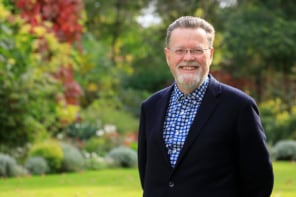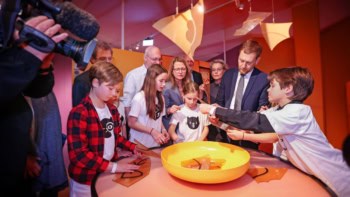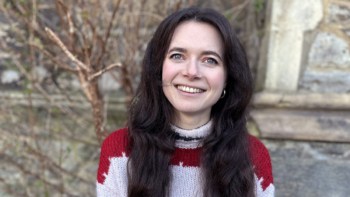Nobel laureate and cosmologist James Peebles from Princeton University talks to Sergio de Régules about winning the prize, cosmological models and his new book

How has life changed since you won the 2019 Nobel Prize for Physics?
When I got the call from Stockholm, they said that my life will change forever. I am rather unnerved that many people now consider me a god-like figure and that I somehow know everything. I receive many messages from people insisting that their situation could be improved if only I would give attention to their new idea. Maybe among all these theories there are some that are interesting, but who has the time to look?
Throughout your career, you have contributed enormously to several areas of cosmology including the big bang theory, but you dislike the term. Why is that?
The problem I have is that a “bang” connotes an event in space–time. It occurs at a place, at a time. Yet the universe has no special place. There are galaxies everywhere that we can observe. There is no place or time involved, no beginning of time anyway. Instead, this is a theory of what happened as the universe evolved from a dense, hot early state. We do not know with any assurance what the universe was doing before it was expanding.
My new book is an attempt to see the commonality around science, sociology and philosophy
So why then do you still use the term “big bang”?
The name is so embedded in our consciousness that I think there is no chance of changing it. No-one ever said science is logical. Oh, everyone says science is logical, but it’s not true. After all, it is done by people and people are notoriously illogical.
What do you think of current ideas about what the universe was doing before it started expanding?
The standard thinking is that cosmic inflation – a period of accelerated expansion – happened during the universe’s earliest stages. But I believe we need alternative theories about what the universe was doing before it was expanding. In my opinion, inflation is given more weight than it deserves because we have precious little evidence that something like inflation happened, so we should treat it with caution, and we should pay attention to alternative pictures. One is Paul Steinhardt’s ekpyrotic universe, which considers a cyclic universe: expansion, regeneration and expansion again, maybe repeating indefinitely. James Peebles, Michel Mayor and Didier Queloz share Nobel Prize for Physics
If the BICEP2 team’s 2014 detection of gravitational waves had turned out to be correct, would that have convinced you of inflation?
Perhaps not totally convinced, but it would have made a very good case. I am not arguing against inflation, I am only saying we must be cautious because we don’t have a lot of evidence. And in physics evidence is the name of the game.
What do you say to people who believe that disagreement among scientists means that science is not to be trusted?
I think that scientists by and large tend to overestimate the power of their theories. On the other hand, it’s difficult to underestimate them. My favourite example is the mobile phone. It’s an object I hate but you must pause to consider the knowledge of physics that went into its design – it is just gorgeous. How could you distrust science if it could give you such a thing?
On the other hand, although we are right to celebrate the power of science, we should more commonly recognize that all our theories are incomplete.
Does that include Λ-CDM – the current cosmological model?
Yes, absolutely. Λ-CDM is incomplete. We should admit more clearly that although our theories are powerful, they are limited and they are incomplete. That, of course, is why we still have jobs. Exoplanet researchers welcome ‘cataclysmic’ Nobel-prize announcement
Do you think our theories will ever be complete?
No, and that is not a popular opinion. My colleague Steven Weinberg, who wrote the book Dreams of a Final Theory, does not like it when I say that we will never know if we have a final theory because knowledge that a theory is good depends on empirical evidence. And when it comes to the economics, we cannot afford to fund arbitrarily complicated tests of arbitrarily complicated theories.
Last year you wrote Cosmology’s Century: an Inside History of Our Modern Understanding of the Universe. What makes it different from other books of its type?
It’s different for one reason: it is my personal experience. The book is not a popular exposition, which I regret, but I wanted to get the story straight, so I had to be technical. I consider cosmology a good example of how natural science is done because it is relatively simple compared, say, to quantum physics.
I have just finished another book, which is closer to popular science.
Can you tell us more about your new book?
In the late 20th century some sociologists took the position that physical science is a social construction, made up by authority figures who impose their will on students and require students to suspend disbelief and to accept their dogma. Physicists, naturally, were incensed at this proposal. The result is a very serious disconnect between sociology and physical science.
There is a real role for sociology of science, and there is a big role for philosophy in its connection to science, so my new book is an attempt to see the commonality around science, sociology and philosophy. The science, you will not be surprised to learn, is that of cosmology. So I attempted to interweave thinking by sociologists about the way we do science, thinking from philosophers as to what they consider to be science, and how science is really done. It all fascinated me.
You were part of a team in the 1960s, led by Bob Dicke, searching for evidence of a cosmic microwave background. What was the feeling on that day when it was announced by another group – Arno Penzias and Robert Wilson?
I have been asked many times whether I was chagrined at being scooped but the reaction in our group was one of excitement, not chagrin. Here was evidence of something new and for me something to analyse, so it was exciting!
Do you believe that Dicke should have shared the 1978 Nobel Prize for Physics with Penzias and Wilson?
I have never made a secret of it that I was annoyed at the decision to exclude Dicke. The strange thing about that year’s prize was it artificially joined two fields, given that Penzias and Wilson shared the award with Pyotr Kapitza for his work in low-temperature physics. The obvious choice was Penzias, Wilson and Dicke.
When I answered the phone call from Stockholm in 2019 concerning my own Nobel prize, it began very formally: “Are you Professor Phillip James Edwin Peebles?” I said, “Yes,” to which they responded: “We have voted to award you the Nobel Prize for Physics. Do you accept?” At that point I could have been tempted to say, “But first let us discuss the omission of Bob Dicke.” But I did not. I meekly said: “I accept,” and the conversation became a lot more friendly.



